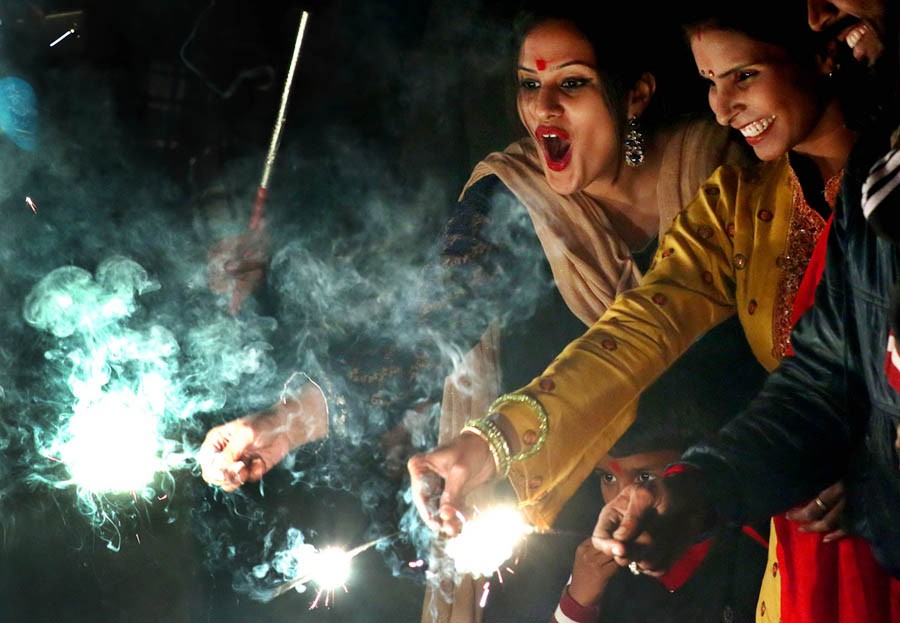
Scenes of interfaith harmony and peaceful co-oexistence are observed at Valmiki Temple

The Lahore of today has only two Hindu temples that are functional. Every year, on the eve of Diwali, as the Hindu population takes to the crumbling old Krishna Mandir, located in the suburbs, the very few Valmiki residents gather at the Valmiki Temple for celebrations. The low-lit temple, situated in a narrow street inside Old Anarkali, is beautifully adorned for the festival.
The cramped, one-storey, flat-roofed temple isn’t only a place of worship but also provides shelter to Lahore’s down-trodden Valmiki community. The temple door opens to a wide space crowded with people of all ages. Men dressed in kurta pyjamas are seen carrying their little children on their shoulders as they play with hand-held crackers.
Sporting bindis and draped in dazzling sarees, women chatter to one another as they light candles and oil lamps. There is a jingle of sounds, performances of devotional songs and bhajans, display of fireworks and anaar bombs.
Coloured design patterns called rangolis are spread out on the floor and a row of beautifully painted traditional earthen diyas add fervour to the festive spirit.
Inside the small room of worship, the idol of Hindu god Valmiki is placed on a low timbered mandap, adorned by garlands of fresh flowers and ornaments. Devotees are seated around on the floor as the Pandit (priest) recites mantras and performs special prayers to mark the occasion.
Despite constant disruptions caused by power outages, a jovial atmosphere prevails as people seem excited and overjoyed. However, the festival of lights which symbolises the triumph of good over evil is, thus, celebrated in sheer darkness.
"Load shedding has become part of our daily life, so it doesn’t bother us anymore. We are happy that at least we have the freedom to celebrate our religious festival," says Bhagat Lal Khokhar, the temple caretaker and priest, talking exclusively to TNS.
"We don’t take any funds from the government but raise money on our own by doing odd street jobs," he asserts. "All religious festivals at the temple are organised from either our own income or donations from organisations."
Crowded by scores of people, the priest seems reluctant to speak about the issues faced by the Hindu community.
"The people have a simple solution to our problems, which is that we should migrate to India. But why do we leave our land?" he asks. "Many Muslims, currently living in Pakistan, migrated from India at the time of partition. However, we have been living here for the past 700 years."
Condemning the wave of intolerance in India, he reveals that back in 1992, in the aftermath of the Babri Masjid attack, an armed mob had stormed into the Valmiki Temple and smashed the idols of Krishna and Valmiki. "The mob broke utensils in the kitchen and the jewellery from inside the temple was also seized. The building was set on fire and pulled down to pieces. It took days for the authorities to extinguish the flames."
A middle-aged man, belonging to the Valmiki sect, says that after partition, some members of the sect were forced to convert to Christianity in order to secure a better future for their children. "Our children weren’t accepted in schools and finding jobs was a major challenge," he says. "However, despite the conversion, our faith in sage Valmiki remains unchanged."
For the uninitiated, Valmiki, an euphemism for untouchables, is a Hindu caste that worships the sage Valmiki, believed to be an avatar of God and his works, the Ramayana and the Yoga Vasistha are considered as Holy Scriptures.
Remarkably, the festival of Diwali, brings together Hindus, Muslims and Christians at Valmiki Temple owned by the Dalit community which has been facing exclusion and oppression for years. Participation of people from other faiths happens to be a symbolic gesture of peace and togetherness in a country where the minority has been subjected to discrimination and torture.
According to Naseem Sadiq, a young Christian rights activist, "We celebrate Diwali every year in solidarity with Lahore’s Hindu community to give the message of interfaith harmony and peaceful co-oexistence. We are all Pakistanis and united in moments of happiness and grief."
Sitting in the Verandah outside the worship room, two catholic priests from Indonesia and South America are busy chatting with the people. "It is the first time that I’m attending Diwali in Lahore. Contrary to what I had heard, it is very interesting to see Muslims, Hindus and Chritisians celebrating the festival of lights," says Andre, a Catholic priest from Indonesia.
Another Catholic priest, who is also an Islamic scholar and hails from South America, is here to attend the festival. He insists that the people of Lahore gave him a warm welcome and he is touched by their hospitality.
A representative of Muslim community, Farhan Wilayat expresses his views by reciting lines from a nazm:
"Meri masjid tu kyun torde, mai kyun tor dun mandir ko,
dono beth kar kyun na dekhein ik duje ke ander ko…"
As the ceremony concludes, Bhagat Lal extends his gratitude to the Christians and Muslims who zealously participated in the festival. Everyone then gathers together for the feast.
Survival for the sparse Hindu community of Lahore is in a constant state of struggle in a Muslim dominated country like Pakistan. Half of the Valmiki Temple space has been grabbed by the Evacuee Trust Property Board (ETPB) which seeks a monthly rent from the temple caretakers. However, despite their several issues, they can celebrate their festivals without any interference, unlike the Diwali ceremony which was held at Krishna Temple under strict supervision of the ETPB. It was, in fact, a peace conference in disguise that left behind no scope for the Hindu community to perform their rituals.